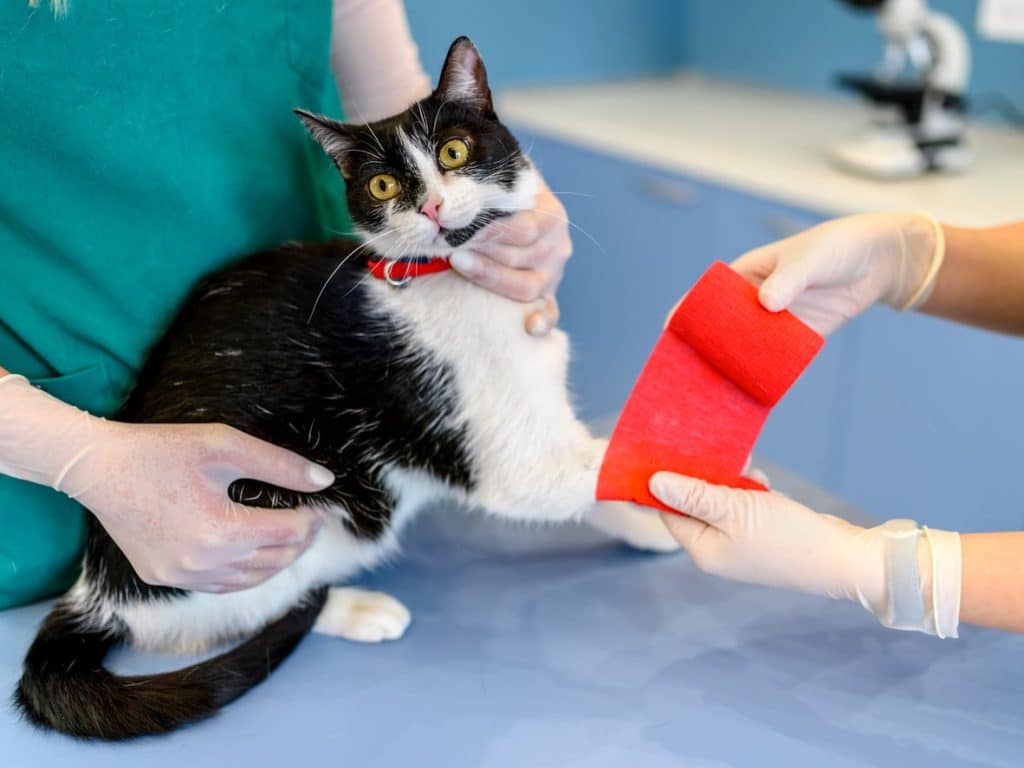- Not a substitute for professional veterinary help.
Did you know your cat’s nails and how they treat them can spill the (toe) beans about their health? While humans might gnaw on their nails out of boredom or anxiety, our cats don’t share that same emotional connection to the notoriously hard-to-kick bad habit.
So what does it mean when we see our kitty companions chomping on their nails? Cat nail biting can range from routine self-grooming to sneaky injuries and infections to easy-to-miss underlying health problems.
Read on as we take a closer look at why cats bite their nails and when pet parents should be concerned.
Why Do Cats Bite Their Nails Normally?
“When cats are biting their nails, they’re not trying to shorten them, like a human might,” Dr. Joanna Woodnutt, MRCVS, a veterinarian at Petlearnia, says. Instead, she says cats chew on their nails to self-groom. Meanwhile, some cats use their teeth and signature rough tongue to pull off any bits of the nail that haven’t shed properly, then they nibble and chew to get at dirt or grit between their nails to keep them sharp.
Highly active, indoor-only cats and kittens typically have claws in tip-top shape and won’t need to do any extra legwork – or should we say teethwork – for bright, shiny, sharp nails. So you most likely won’t see them gnawing their nails too often.
As cats get older, their nails less readily shed the outer layer. Senior cats can also struggle with arthritis, joint pain, and limited flexibility and mobility, making it more challenging to stretch vertically and use scratching posts or corrugated cardboard houses. This means they might use their teeth to help maintain their nail health.
If you occasionally notice your senior kitty chewing and pulling at their nails and they don’t have any new or unusual behaviors, it’s not a cause for alarm.
What are the Medical Causes of Cat Nail Biting?
If you’ve suddenly noticed your cat biting and pulling their nails daily, something else might be afoot. Beyond routine self-grooming, aging, or mobility-related difficulties, the three most common medical problems linked with excessive nail biting include the following.
Injuries
Sometimes small foreign objects get lodged in a cat’s paws or toes, including between or under their nails. Veterinarians will sometimes need to do surgery to remove said objects. Broken toes, which can be diagnosed with X-rays, can also be what causes abnormal nail biting and pulling.
Infections
Dr. Woodnutt says nail bed infections are often caused by trauma and flare up when cats excessively lick at their feet. Additionally, Dr. Amber Carter, DVM, ABVP board-certified feline practitioner, says ingrown nails can also lead to painful nail bed infections.
Bacterial or fungal infections, allergies, and parasites like mites and fleas can also cause infections in your cat’s paws and nail beds. To avoid injuring your cat and for both your and their safety, it’s best to avoid self-diagnosing your cat and to bring them to your veterinarian right away so they can check the paw in question and examine it for any other signs of injury and pain.
Illnesses
Dr. Carter says autoimmune diseases like Pemphigus Foliaceus can lead to nail biting and pulling. Your veterinarian can diagnose this through pus and skin lesions in your cat’s nail bed. Certain types of cancer, specifically lung-digit syndrome, also manifest as nail issues in cats. The first sign of lung-digit syndrome is often a nail issue, such as swelling, inflammation, and pus discharge. A veterinarian will evaluate your cat for other respiratory symptoms, like coughing.
Anxiety
While Dr. Woodnutt says anxiety and stress aren’t a direct cause of nail-biting, they can lead to overgrooming.
Anxiety or stress-fueled overgrooming, also known as psychogenic alopecia, tends to appear on the afflicted cat’s stomach, inner thighs, or the sides of their stomachs, also known as their flanks. Visually unmistakable, psychogenic alopecia occurs as red and inflamed skin, bald patches, sores, skin lesions, increased hairballs, and vomiting.
If you’re worried that anxiety is causing abnormal nail chewing in your cat, visit your vet to rule out other possible causes.

iStock/dardespot
Do I Need to Worry If My Cat Has Started Nail Biting?
Nail biting every so often in cats is normal and nothing to worry about. However, Dr. Woodnutt explains that if pet parents notice their cat biting their nails more than once a day, especially if it’s on the same foot, it’s time to investigate.
The biggest red flag to look out for is out-of-character behavior. If your cat doesn’t usually bite or pull on their nails and suddenly starts to do so, especially if you also spot them chewing or licking their paws, their abnormal self-grooming behavior might indicate that an underlying problem or medical condition is triggering their change in behavior.
How Do You Treat Nail Infections?
Since nail infections can take a longer time to heal, Dr. Woodnutt says to get prompt treatment; if not, these infections can permanently damage your cat’s foot, cause pain/distress, and even lead to a bone infection that might require amputation.
For these reasons, Dr. Woodnutt and Dr. Carter advise cat parents against home treatments and urge them to visit their veterinarian immediately when they notice abnormal nail biting and chewing. Instead, vets will prescribe oral antibiotics or topical treatments like antibacterial washes for several weeks, so getting them the proper treatment as soon as possible is essential.



